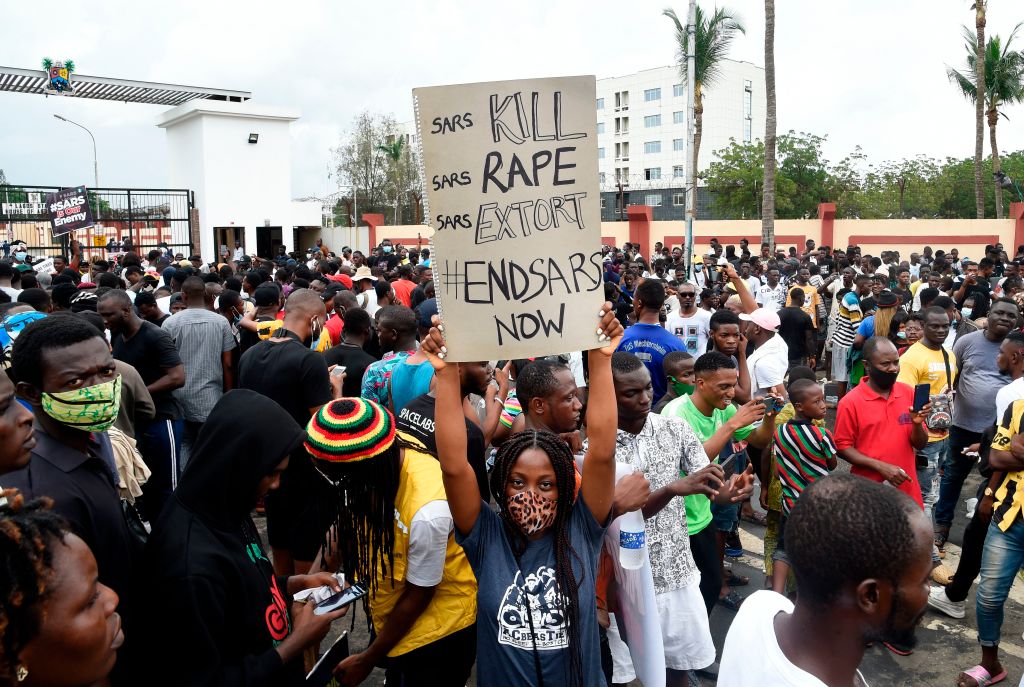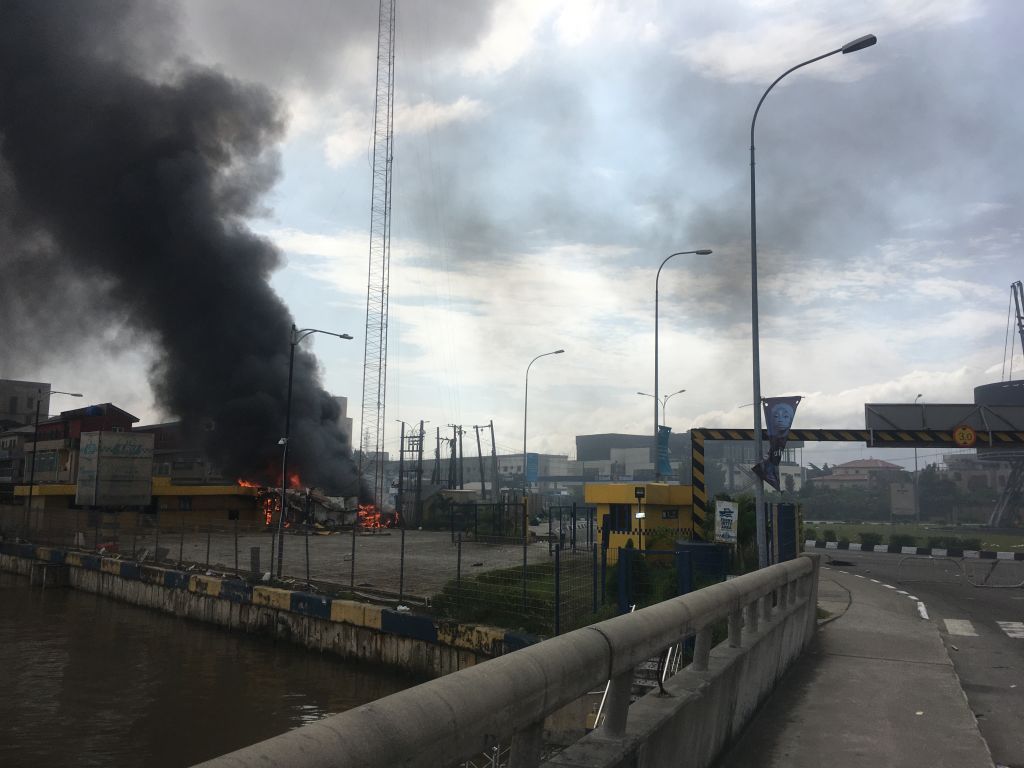
An on-the-ground investigation by Amnesty International has confirmed that the Nigerian army and police killed at least 12 peaceful protesters on Oct. 20 at two locations in Lagos. The rights group says the killings took place at Alausa and Lekki, both suburbs of Lagos. On Tuesday evening, reports and videos on social media appeared to show the Nigerian army opening fire on unarmed peaceful #endSARS protesters at the Lekki toll gate in Lagos after reportedly turning off the street lights and cutting phone networks.
What is #endSARS?
Nationwide protests against police brutality began on Oct. 8, after a video emerged in early October showing police officers thought to be from the notorious Special Anti-Robbery Squad, or (SARS allegedly shooting and killing a young man in Nigeria’s southern Delta State. Although Nigerian authorities denied the reports, protests erupted across the country calling to disband the unit and #endSARS. Though they are leaderless, the demonstrations are mostly driven by young people who say they have been unfairly profiled by SARS.
The #endSARS hashtag dates back to at least 2017, when it was used to share experiences of assault and violence. SARS was formed in 1984 to combat an increase in armed robbery and crime but has been widely accused of unlawful arrests and other abuses. Amnesty International reported at least 82 cases of torture, ill-treatment and extra-judicial execution between January 2017 and May 2020. Despite promises of reform, Amnesty says SARS officers still act with impunity.

What happened in Lekki and Alausa on Oct. 20?
Several videos circulating on social media showed crowds gathering at the Lekki toll gate in one of the suburbs of Lagos, where #endSARS protesters have been camped for two weeks. Witnesses told the BBC that uniformed men opened fire, and soldiers were seen barricading the protest site before the shooting, and Amnesty International received reports that shortly before the shootings, CCTV cameras at the Lekki toll gate were removed by government officials and the electricity was cut in an attempt to hide evidence. Video footage showed protesters singing the national anthem in the darkness, the noise gunfire as people ran away from the scene, and protesters tending to the injured at the scene. According to Amnesty International, at least 56 people have died across the country since the protests began, with about 38 killed on Tuesday alone.
Eyewitnesses at a separate protest site in Alausa told Amnesty International that they were attacked by a team of soldiers and policemen from the Rapid Response Squad (RRS) Unit at about 8 p.m., leaving at least two people dead and one critically injured.
How has the Nigerian government responded?
On Oct. 11, the government announced the disbanding of SARS. This is the fourth time there has been an announcement of either the disbanding or reform of the force, but activists say the move does not go far enough. Protesters have five core demands, including justice for the families of victims of police brutality, retraining of SARS officers before they are redeployed to other police units, and an independent body to oversee investigations into police brutality. Protesters have also expanded their aims beyond police brutality to harness frustration at years of corruption and bad governance.
On Wednesday, President Muhammadu Buhari’s office issued a statement calling on people to have patience as police reforms “gather pace,” but did not mention the shootings from the night before. The Nigerian military has not issued a statement about events in Lekki, but posted screenshots to Twitter calling several credible news reports about it “fake news.” The government is now extending curfews beyond Lagos, which was already under restrictions, to other cities across Nigeria. In a televised briefing Wednesday, Lagos governor Obaijide Sanwo-Olu said he has ordered an investigation into the military’s actions at Lekki. Sanwo-Olu confirmed more than 20 injuries, but said that no one had been killed.
How has the world reacted?
The protests, organized via social media, have won the support of celebrities abroad including Nigerian Afrobeat star Wizkid and British-Nigerian actor John Boyega. Beyoncé and Rihanna also shared messages of solidarity with Nigerian protesters via Twitter following the events at Lekki.
On Tuesday following the events at Lekki, U.S. presidential candidate Joe Biden urged Nigerian authorities to cease the “violent crackdown on protesters” and former presidential candidate Hillary Clinton tweeted calling on Nigeria’s president Muhammadu Buhari to “stop killing young #EndSARS protesters.” Solidarity protests are taking place in London and outside the Nigerian embassies in Pretoria, South Africa and Nairobi, Kenya on Wednesday.
More than 180,000 people have signed a petition calling for the U.K. government to implement sanctions against the Nigerian government and officials. Via a spokesperson, the U.N. Secretary-General condemned Wednesday “the violent escalation” in Lagos and called on Nigerian authorities to “investigate these incidents and hold the perpetrators accountable.” On Thursday, U.S. Secretary of State Mike Pompeo issued a statement condemning the use of excessive force by the Nigerian military in Lagos and that U.S. welcomes an immediate investigation.
What is happening in Nigeria now?
Unrest across Nigeria continued through Wednesday and Thursday. Local media reported that two television stations in Lagos were burned and destroyed, video footage showed the remains of a raided a mall in Lekki, and the BBC reports that the high court in Lagos island was set ablaze.
The company that manages the Lekki toll gate, disputed Amnesty’s eyewitness accounts that cameras were removed from the area on Tuesday night before the shootings. Curfews were imposed in Lagos state and across other parts of the country, including Delta state where protests began in early October. Lagos governor Sanwo-Olu said Thursday that the Nigerian military has offered to deploy forces if needed to protect businesses and government sites amid the unrest. In a short televised address and Twitter thread Thursday evening, Buhari urged protesters to stop demonstrating and engage with the government in “finding solutions.” He did not address the shooting of protesters in Lagos on Oct. 20.
Following Buhari’s address on Thursday evening, Feminist Coalition, a collective of Nigerian women that has been helping organize protests and supporting protesters, advised people to stay at home and follow any curfews in place in their states. “We are young Nigerians with hopes, dreams and aspirations for our country,” their statement on Twitter said. “This means we need to stay alive to pursue our dreams to build the future.”
More Must-Reads from TIME
- Cybersecurity Experts Are Sounding the Alarm on DOGE
- Meet the 2025 Women of the Year
- The Harsh Truth About Disability Inclusion
- Why Do More Young Adults Have Cancer?
- Colman Domingo Leads With Radical Love
- How to Get Better at Doing Things Alone
- Michelle Zauner Stares Down the Darkness
Contact us at letters@time.com